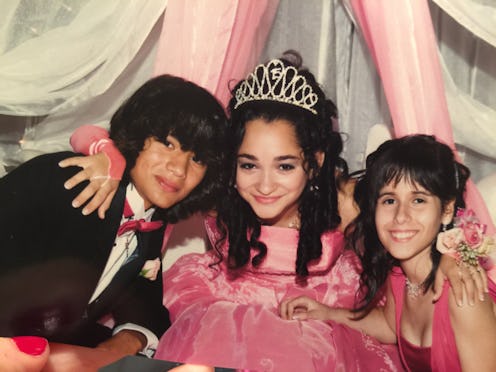Entertainment
The Disabled Latinx Community Has Been Ignored On TV — Here's How To Change That

Growing up as a Disabled Latina who spent a lot of time in the hospital, TV was always my escape. It’s where I learned about the world around me and where I yearned to see my culture shown when I couldn’t go home and live it myself. In the early 2000s, I would tune into my favorite show Taina. The Nickelodeon hit, about a young Puerto Rican girl living in New York (City), gave me a sliver of my culture that I desperately wanted to see represented in a world where the Latinx community was often forgotten. But things are changing; that isn’t the same story today with shows like Jane the Virgin and One Day at a Time becoming more prevalent. But while I get to see my culture represented, finally, there continues to be a missing piece in these narratives: disability.
As a child, I always enjoyed seeing Taina figure out her Puerto Rican identity and, similar to me, daydream about what her quinceañera would be like. I also enjoyed learning about other Latinx cultures on TV like on the George Lopez Show, a series about a Mexican-American family, which exposed me to the diversity of Latinidad. But my Latinx community has a difficult time acknowledging that the Disabled Latinx community exists. In the statistics of Latinx people in the United States, Disabled Latinx aren’t segmented; we’re commonly forgotten. For instance, when I met my last boyfriend’s sister for the first time (their family is from Mexico), she told me to my face that I couldn’t be disabled because “our people aren’t like that, it’s a white person thing.” Within the Latinx culture, to be disabled, or “discapaz,” means to be pitied for way too many. And if you’re not being prayed for to be healed (something my Abuela did “for” me, often when I was growing up), it isn’t something that is appropriate to talk about. Period.
Growing up, I learned to be ashamed of who I am because there were so few positive disabled Latinx representations on TV.
As I’ve grown into my adult years, it has made me happy to see Latinx-centered media begin to share stories of other marginalized non-disabled groups in the Latinx community (LGBTQ+, Afro-Latinx, Indigenous-Latinx). Representation is slowly improving with how these identities are viewed with TV shows like One Day at a Time having a teenager like Elena Alvarez come out as queer and work through the emotions while seeking acceptance from her Cuban family. Jane the Virgin highlights characters of color tackling the topic of immigration, all while making a political statement about our government and its treatment of people seeking a better life.
Although these strides are giving us a diverse representation of Latinx culture and are being received fairly well by the community for being marathon-worthy, if Disabled Latinx were to be included in the narrative, would the public receive it as well? I’ve noticed that non-Latinx communities are just starting to embrace disabled narratives on their TV screens. Often, disabled representation in Hollywood, like in the novel-turned-film Me Before You starring Emilia Clarke and Sam Claflin, portrays the harmful stereotype of disability being a burden. However, shows like ABC’s sitcom Speechless have been a game changers for showing a disabled lead character happy with their life. But that’s just starting to happen now. Growing up, I learned to be ashamed of who I am because there were so few positive disabled Latinx representations on TV. Hearing from my Latinx community that disabled Latinx don’t exist — or that there’s “no need” for us to be shown — told me that my place as a Disabled Latina within Latinidad wasn’t welcomed.
I worry that when the time comes for a disabled Latinx person to make it to the screen, people will reject the character. From personal experience with family and Latinx friends, when I suggest using less ableist language (like stu*id and cr*zy), or ask for them to not make fun of me for not being able to dance well because of my disability thanks to the stereotype that if you’re Latina you should be able to dance well), they often respond with, “You’re being too sensitive.” Their comments, while harmless to them, are invalidating (to me), which (and) can create a dangerous environment for these stories to be told. On my YouTube channel “Disabled y Latinx”, I have been met with annoyance and a push to dismiss calls for inclusion. It makes supporting representation for my community difficult.
Our disabled stories deserve to be told. We deserve to be shown and normalized among our Latinx community. Television is the first step with introducing these stories to the masses, and with help of amazing Disabled Latinx actors and writers popping up, you’ll see Disabled Latinx characters in media in no time. So get ready, because it’s going to be a fantastic show.
For more Latinx Heritage Month content on Bustle, click here.